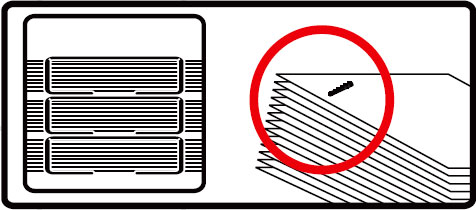Q.1Why do the staple ends stick out of the paper stack after stapling?
Ans. The staple is too long. Please note that 10 sheets of standard paper (80g/m²) are approx. 1 mm thick. The height of the paper stack plus 3 mm provides the ideal staple leg length.
Q.2Heavy duty punching discs is not working?
Ans. The Heavy duty punching discs and cutting dies may be worn out. Spares are available from us.
Q.3Why can I staple only once even though the stapler is filled with staples?
Ans. You are not using original staples. Staples are wrongly formed therefore not able to go forward. Original Staples fit properly and can be easily moved on the staple magazine.
Q.4What's the difference between a flat clinch and standard parallel clinch staplers?
Ans. This means end of the Staple legs curl up and bind your documents. Flat clinch Staplers bend and press flat both staple legs after they have gone through your documents. This saves approx. 30% space by preventing the staple bulge from pinned documents.
Q.5What are the different stapling modes and why do I use them?
Ans. Standard (Parallel) Clinch – The ends of the staple legs curl up and clinch your documents. Used for stapling documents.
Flat Clinch 
– The ends of the staple legs are bent and pressed flat after clinching your documents. This saves 30% space when filling stapled documents.
Temporary
Pinning 
– The staple pierces the document and the staple legs are straight for easy removing. This method is used if stapled documents will be added to or rearranged in the future.
Tacking 
– In this method documents are stapled to a flat surface.
Q.6My Kangaro stapler does not staple to your estimated capacity. Why?
Ans. All staplers are tested using our Staples. Using our staples will ensure trouble free operation.
Q.7How can I avoid jamming a stapler?
Ans. By using the recommended staple type and size, and not stapling above the stated sheet capacity you can avoid jams. Selected range of Jam clearing staplers is also available in which staples can be easily removed in case of a jam.

Q.8Do all staplers load the same way?
Ans. No Staplers include top load, front load and rear load models. Top load allows you to open the top of the stapler to drop in a strip of staples. Front load staplers have a staple magazine that pops open from the front end of the stapler. Back load models have a staple tray that extends from the back end of the stapler.
Q.9Where can I obtain a copy of my product manual?
Ans. Product manual is available on the specific product model page. Alternately you can contact us at: info@kangaro.com
 – The ends of the staple legs are bent and pressed flat after clinching your documents. This saves 30% space when filling stapled documents.
Temporary
– The ends of the staple legs are bent and pressed flat after clinching your documents. This saves 30% space when filling stapled documents.
Temporary – The staple pierces the document and the staple legs are straight for easy removing. This method is used if stapled documents will be added to or rearranged in the future.
– The staple pierces the document and the staple legs are straight for easy removing. This method is used if stapled documents will be added to or rearranged in the future.